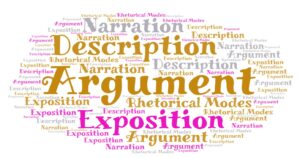What is Rhetorical Reasoning?
Rhetorical reasoning is an analytical process.
Rhetorical reasoning, from the perspective of the writer or speaker, is the act of sorting through different rhetorical moves, and then deciding on a course of action, a rhetorical stance. Writers engage in rhetorical reasoning to determine the best way to respond to an exigency, a call for discourse.
Acts of rhetorical reasoning include
- considering potential rhetorical appeals, rhetorical devices, and rhetorical modes to use in a response to an exigency, a call for discourse
- researching media, genres, diction, and rhetorical stances to decide on how you need to shape and disseminate your message
- investigating how scholarly conversations on a topic have evolved over time
- identifying what the audience or community of practice knows and doesn’t know about the topic, and identifying gaps in knowledge claims.
Rhetorical reasoning—from the perspective of the reader, listener, user . . .—is the act of questioning why a writer would say or do something. It’s a deep dive into the psyche and lived experience of the writer. When reading texts, readers, listeners, and users . . . may be curious about how an author’s history, ethnicity, gender, sexual orientation, socioeconomic status, influences their texts, compositions, and composing processes.
Rhetorical reasoning is grounded in belief and theory as opposed to empirical observation, replicable data, or other scientific methods. Ultimately, there’s no way other to judge whether one line of rhetorical reasoning is superior to another. Unlike the scientific method, rhetorical reasoning is not focused on empirical observation or experimentation. Rather, rhetorical reasoning is a tool of invention and critique, and it is critical to composing and interpretation.
Rhetorical reasoning can be a tacit process. In other words, writers may engage in rhetorical reasoning without even being aware that they are doing so. Rhetorical analysis, in contrast, requires metacognition on on the part of the writer.
Related Concepts: Information Literacy; Document Planner; Interpretation; Rhetorical Analysis; Rhetorical Knowledge
Rhetorical Reasoning is a fairly underdeveloped concept. It has been characterized as a form of rhetrickery (Fincher), as a form of argument, a method of interpretation, and as the use of rhetorical theory to inform composing and interpretation. For instance, a literary critic may employ a theory (e.g., Feminist Criticism or Psychological Criticism) to develop an argument about what a text means or why a text was shaped as it was (see Literary Criticism).
in my view, rhetorical reasoning is best thought of as a way of sorting through different rhetorical moves and deciding which move is most appropriate for a given rhetorical situation. Rhetorical reasoning is an act of rhetorical analysis, even if the writer, speaker, knowledge worker . . . is unaware that they are engaged in rhetorical reasoning. For writers, rhetorical reasoning is the process of deciding what you need to say about the topic and how you need to say it, its style.
Rhetorical Reasoning & Composing Processes
Rhetorical Reasoning informs composing, composing processes, and interpretation.
From the perspective of the writer, the goal of rhetorical reasoning is to figure out how to best respond to an exigency, a call for discourse. Before settling on a rhetorical stance, writers are wise to carefully evaluate their rhetorical situation.
Related Concepts
Rhetorical reasoning and rhetorical analysis are nearly synonymous. The term rhetorical analysis may be reserved for more deliberate reviews of the rhetorical context. In contrast, rhetorical reasoning may be more informal, more inchoate.
References
Fincher, C. (1994). What is rhetorical reasoning? Research in Higher Education, 35(3), 387-391.






